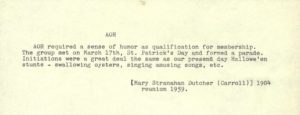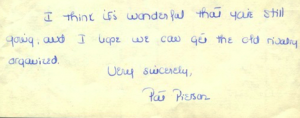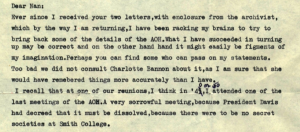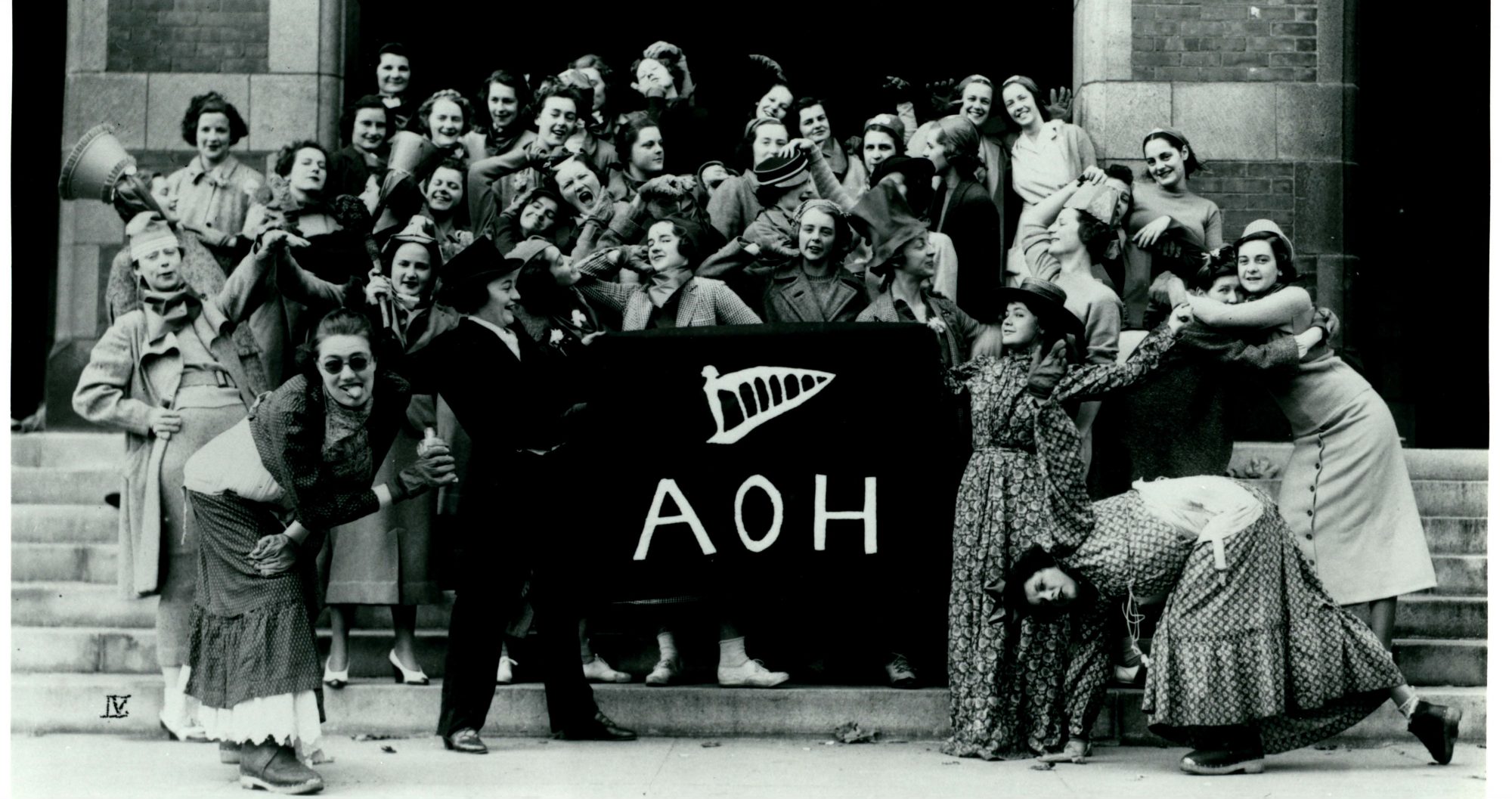As L. Clark Seelye wrote in his history of Smith College, about Alpha Society and Phi Kapa Psi, “these societies were exclusive rather than secret, as the Faculty had discouraged the organization of any secret societies.”1 He did not acknowledge the other secret societies that did start in his tenure as president.
How do you study secret societies? With some difficulty. It is in the name itself, they are a secret. But, these two societies among others are documented in Smith College’s institutional archives as evidenced by my research. The dean or “Warden” knew about the secret societies. The student body knew, it was throughout the student paper. While of course it is unknown to what degree secret societies were always present and visible to all students, they did figure into college discussions. Ironically, once the societies fell under scrutiny in the student paper, they became more underground and secret.

Many questions linger. Why did these students found secret societies at Smith College? A hunch could be to reckon with male institutions that excluded them, since they were based on male fraternal orders. Were they just messing around? We don’t know. But, there was clearly a commitment to preserving these societies. With student turnover, things naturally ebb and flow in a college community as the students do. But, the A.O.H. and Orangemen lasted officially for almost fifty years.
Searching for the A.O.H. and Orangemen
It is admittedly harder to trace the Orangemen back in the archive than it is to track the A.O.H. This is something that others have picked up on as well. In a student paper written in December of 1989, Melissa Gastellum writes that maybe the Orangemen were more intense with keeping their secrets.2 Additionally, when the Orangemen stole the A.O.H.’s scrapbook in 1938 and left their mark all over it, they wrote that their book had not been stolen before.3 This book is not in the Smith College Archives.
One can follow the A.O.H. up until 1966 through their scrapbook, but the Orangemen are more difficult to trace.4 In a letter written after 1948, a former secret society member, Pat Pierson, possibly an Orangeman, wrote to someone who was likely a current Smith student, named Ann. While only Pierson’s response is available, it is evident that there was an interest in the history of the two societies at Smith and seemingly both the Orangemen and A.O.H. still existed, though the letter is undated so it cannot be known for sure when this was. Pierson writes, “I was so glad to get your letter and learn the 2 clubs are still in existence.”5

As Smithipedia points out, definitive end dates can not be placed on these groups based on the nature of secret societies.6
Preserving the A.O.H. and Orangemen
There were clear efforts to archive both secret societies in the Smith College Archives. A founding member of A.O.H., Alice Martin Turner ‘1895, wrote to another classmate with what she could remember about the A.O.H. sometime after 1950 and referenced the archivist. She was one of few surviving founding members.7

Footnotes
- Laurenus Clark Seelye, The Early History of Smith College, 1871-1910 (Boston, New York: Houghton Mifflin company, 1923), 79, https://catalog.hathitrust.org/Record/001452501. ↩
- Melissa Gastellum, “Girls Just Want to Have Fun: A Brief Overview of Two Secret Societies at Smith College,” page 3, December 12, 1989, Box 1, Student Papers and Theses Collection, Smith College Archives, Smith College Special Collections, Northampton, Massachusetts. ↩
- Scrapbook, 1938-1966, Ancient Order of Hibernians Records, Box 3011.1, Smith College Archives, CA-MS-00023, Smith College Special Collections, Northampton, Massachusetts. ↩
- Scrapbook, 1938-1966, Ancient Order of Hibernians Records, Box #3011.1, Smith College Archives, CA-MS-00023, Smith College Special Collections, Northampton, Massachusetts. ↩
- Correspondence between Pat Pierson and Ann, undated, Correspondence, St. Patrick’s Day Letters, 1926-1956, undated, Ancient Order of Hibernians Records, Box #3011.1, Smith College Archives, CA-MS-00023, Smith College Special Collections, Northampton, Massachusetts. ↩
- Smithipedia. “Secret Societies.” Accessed February 23, 2022. https://sites.smith.edu/blog/smithipedia/student-life/secret-societies/. ↩
- Alice Martin Turner to Anna Paret Davis, undated, Correspondence, St. Patrick’s Day Letters, 1926-1956, undated, Ancient Order of Hibernians Records, Box #3011.1, Smith College Archives, CA-MS-00023, Smith College Special Collections, Northampton, Massachusetts. ↩
